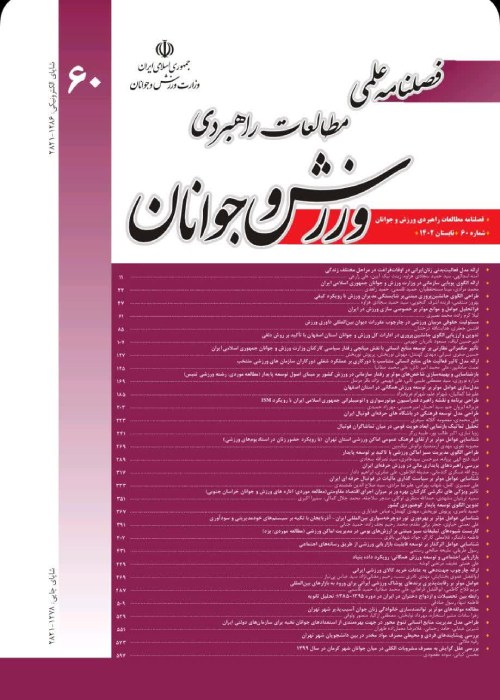Marriage Requirements and Young People's Strategies for Encountering Marriage
Author(s):
Abstract:
This article focuses on three issues. At first, it concentrates on marriage requirements from young people's point of view. Then, it emphasizes on strategies by which young people face with marriage. Furthermore, the article continues with researching on how young people percept marriage requirements and how young people make their decisions on marriage. In this qualitative inquiry information has been gathered through structured interviews. Interviews have been transcribed and changed to texts and then analyzed by thematic accounts. Sample consists of single and married men and women from different classes. Their ages are between 20 up to 40. Based on interviewees accounts marriage requirements are summarized in three categories which are materialistic, non-materialistic and social. These requirements are transformable and can change to each other. Although young people from different classes point to materialistic requirements, lower classes are more inclined to them. Sticking to non-materialistic requirements is seen more repeatedly in middle and upper classes. As a result marriage requirements for middle and upper classes are more subjective and for lower classes are more objective. In referring to marriage requirements women are more inclined to subjective or non-materialistic issues whilst men are more interested in objective or materialistic issues. Also for women, existence of a person who wants to marry her is the most important issue in marriage requirements. Yong people strategies in encountering marriage are rooted in two modes of marriage: un-predictable or all at once marriage and predictable or planned marriage.
Interviewee's accounts indicate that young people strategies in encountering marriage are under the influence of gender. In this stance marriage for women in comparison with men are more un-predictable. Therefore their strategies for encountering marriage are more flexible and even liquid. Supremacy of flexible procedures in marriage encountering strategies shows that young people benefit from both planned and casual or contingent arrangements. They have learned how to be flexible and how to mix planning and contingency. In this setting, indeed, class is the main determinant factor. Upon it upper classes emphasize on individual modes of decision making, consist of planning and making life guideline procedures, whereas lower classes rely on chance and luck. Findings indicate although young people accept their responsibility for marriage procedures, but they yet are under the influence of structural factors, like class and gender. This means young people face a paradoxical situation in which they cannot afford marriage procedures but without doubt they acknowledge their responsibility for those procedures. Based on sociological perspectives this situation is defined as an epistemological fallacy in late modernity. In this account although they do not have power to manage their marriages but they accept their responsibility for managing marriage procedures.
Interviewee's accounts indicate that young people strategies in encountering marriage are under the influence of gender. In this stance marriage for women in comparison with men are more un-predictable. Therefore their strategies for encountering marriage are more flexible and even liquid. Supremacy of flexible procedures in marriage encountering strategies shows that young people benefit from both planned and casual or contingent arrangements. They have learned how to be flexible and how to mix planning and contingency. In this setting, indeed, class is the main determinant factor. Upon it upper classes emphasize on individual modes of decision making, consist of planning and making life guideline procedures, whereas lower classes rely on chance and luck. Findings indicate although young people accept their responsibility for marriage procedures, but they yet are under the influence of structural factors, like class and gender. This means young people face a paradoxical situation in which they cannot afford marriage procedures but without doubt they acknowledge their responsibility for those procedures. Based on sociological perspectives this situation is defined as an epistemological fallacy in late modernity. In this account although they do not have power to manage their marriages but they accept their responsibility for managing marriage procedures.
Keywords:
Language:
Persian
Published:
Strategic Studies On Youth and Sports, Volume:15 Issue: 34, 2017
Pages:
195 to 219
magiran.com/p1742828
دانلود و مطالعه متن این مقاله با یکی از روشهای زیر امکان پذیر است:
اشتراک شخصی
با عضویت و پرداخت آنلاین حق اشتراک یکساله به مبلغ 1,390,000ريال میتوانید 70 عنوان مطلب دانلود کنید!
اشتراک سازمانی
به کتابخانه دانشگاه یا محل کار خود پیشنهاد کنید تا اشتراک سازمانی این پایگاه را برای دسترسی نامحدود همه کاربران به متن مطالب تهیه نمایند!
توجه!
- حق عضویت دریافتی صرف حمایت از نشریات عضو و نگهداری، تکمیل و توسعه مگیران میشود.
- پرداخت حق اشتراک و دانلود مقالات اجازه بازنشر آن در سایر رسانههای چاپی و دیجیتال را به کاربر نمیدهد.
In order to view content subscription is required
Personal subscription
Subscribe magiran.com for 70 € euros via PayPal and download 70 articles during a year.
Organization subscription
Please contact us to subscribe your university or library for unlimited access!



